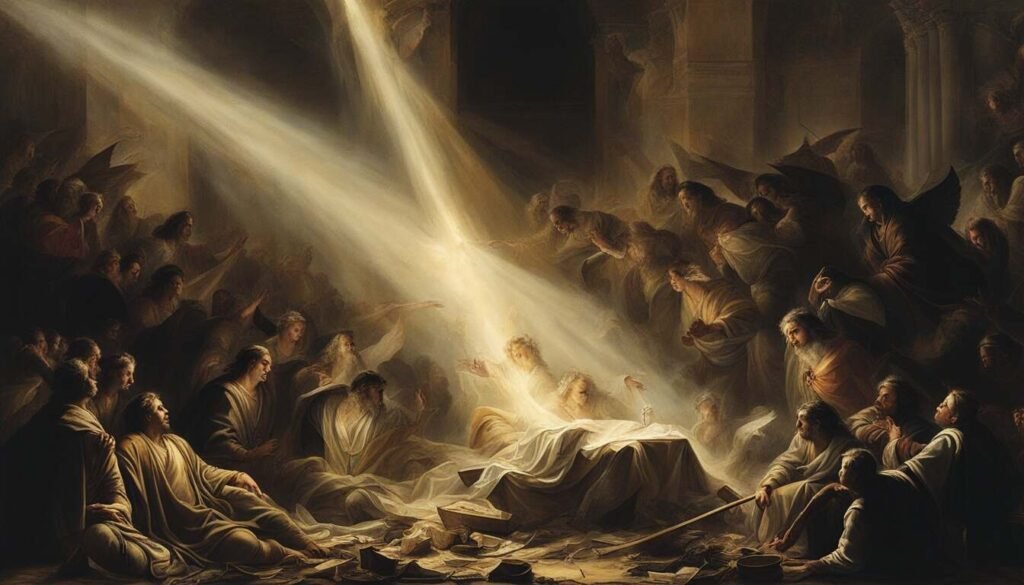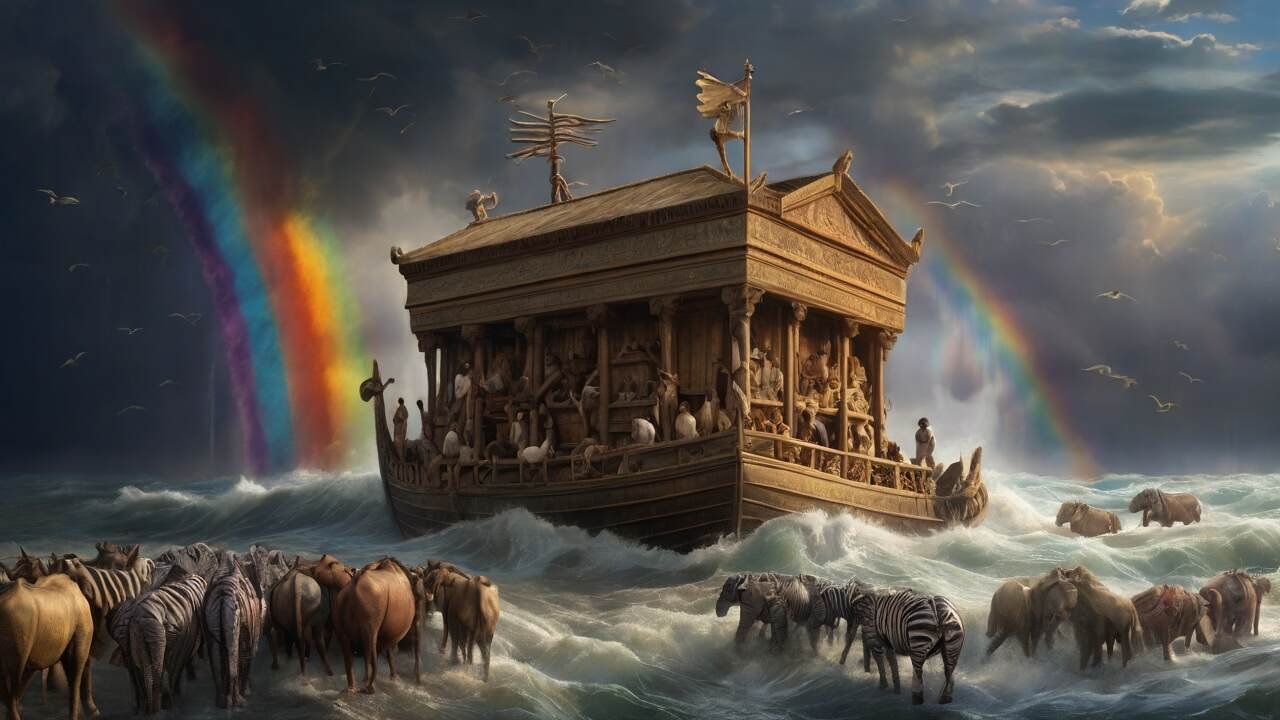Delving into the supernatural can be both captivating and unsettling, as the human mind is naturally curious about the invisible spiritual world where demons and angels reside. In Christianity, the supernatural has a significant influence on the physical world, and demons and angels in the Bible play a major role in the events that transpire on earth. This article will explore the biblical portrayal of fallen angels and demons, uncover their origins, roles, and significance in the ongoing spiritual warfare as depicted in Scripture.
Key Takeaways
- Fallen angels and demons are significant figures in the biblical narrative, shaping the spiritual landscape and influencing earthly events.
- The Bible provides detailed accounts of the rebellion of Lucifer and the subsequent fall of angels who followed him, leading to the creation of demonic forces.
- Demons are portrayed as powerful spiritual entities with the ability to influence and possess human beings, causing spiritual and physical harm.
- Understanding the biblical portrayal of fallen angels and demons is crucial for comprehending the cosmic battle between good and evil as described in Scripture.
- Exploring the biblical accounts of the supernatural world can deepen one’s appreciation for the spiritual realities that shape the human experience.
The Definition of Angels in the Bible
According to the Bible, angels (ἄγγελος) are divine, supernatural beings created by God to serve as His messengers and carry out His will on Earth. These celestial entities are portrayed in the scriptures as powerful, spiritual guardians with extraordinary abilities, tasked with diverse ministering duties.
Angelic Duties and Characteristics
Angels are commissioned by God to fulfill various roles, including protecting and rescuing believers, fighting spiritual battles, and delivering divine messages. They are often described as having wings, the ability to appear in human form, and the capacity to influence the physical and spiritual realms. The Bible specifically mentions several types of angels, such as archangels, cherubim, and seraphim, each with their own distinct characteristics and responsibilities.
The Rebellion of Lucifer and the Fall
However, the Bible also tells the story of Lucifer, a once-prominent angel who rebelled against God and led a third of the angels in Heaven to join him. This rebellion resulted in Lucifer and his followers becoming known as fallen angels or demons, who now work to oppose God’s purposes and influence humanity. The account of Lucifer’s fall from grace is a pivotal narrative in the biblical portrayal of the spiritual realm and the ongoing battle between good and evil.
“How you have fallen from heaven, morning star, son of the dawn! You have been cast down to the earth, you who once laid low the nations.” – Isaiah 14:12
| Angelic Types | Characteristics | Responsibilities |
|---|---|---|
| Archangels | Highest-ranking angels, such as Gabriel and Michael | Lead angelic armies, deliver divine messages, and protect believers |
| Cherubim | Powerful, winged creatures that guard the throne of God | Protect the holiness of God and his creation |
| Seraphim | Six-winged angels that worship God constantly | Worship and praise God, conveying His holiness |
Discuss the portrayal of fallen angels or demons in the Bible
The Bible’s portrayal of fallen angels and demons is a crucial aspect of understanding the ongoing spiritual warfare between good and evil. These entities, once servants and worshippers of God, have fallen from grace and now seek to tempt and influence humanity, aiming to drag as many souls as possible into eternal damnation.
In the Bible, demons (δαίμων) are essentially fallen angels, evil spirits who rebelled against God under the leadership of Lucifer, also known as Satan. The Scriptures state that these rebellious angels were defeated and cast down to earth, where they now dwell and continue their nefarious activities.
The biblical accounts of fallen angels and demons provide valuable insights into the nature of spiritual warfare. These entities are depicted as cunning, manipulative, and relentless in their pursuit of human souls. They are believed to possess supernatural powers and to be capable of influencing human thoughts, emotions, and actions.
One of the most well-known examples of fallen angels in the Bible is the story of Lucifer’s rebellion and subsequent fall from grace. According to the Book of Isaiah, Lucifer, a powerful archangel, became consumed by pride and ambition, leading him to challenge God’s authority. As a result, Lucifer and his followers were cast out of heaven and became known as the fallen angels or demons.
“How you are fallen from heaven, O Lucifer, son of the morning! How you are cut down to the ground, You who weakened the nations!” (Isaiah 14:12)
The Bible’s portrayal of fallen angels and demons serves as a warning to believers, reminding them of the constant spiritual battle they face and the importance of remaining steadfast in their faith. By understanding the nature and tactics of these fallen beings, Christians can better equip themselves to resist temptation and overcome the forces of evil.
In the pages of the Bible, the stories of fallen angels and demons vividly illustrate the ongoing conflict between the forces of light and darkness, urging believers to remain vigilant and to put on the full armor of God to withstand the wiles of the devil.
The Definition of Demons in the Bible
In the biblical context, demons are often described as evil spiritual entities, fallen angels who rebelled against God and were cast out of Heaven. These demons are portrayed as possessing the power to influence and even inhabit human beings, altering their physical, emotional, mental, and psychological states.
Demons’ Origins and Influence
The Bible suggests that demons originated from angels who once served God in Heaven but were deceived by Lucifer and chose to follow him in his rebellion against the divine. This act of defiance led to their exile from the celestial realm, transforming them into malevolent spiritual forces that now seek to corrupt and control humanity.
Throughout the Scriptures, demons are depicted as wielding considerable influence over the lives of individuals, manifesting in various forms of demonic possession and spiritual warfare. Their presence is often associated with physical ailments, mental anguish, and psychological turmoil, underlining the destructive nature of these fallen angelic beings.
Demon Possession and Expulsion
- The Bible provides numerous accounts of Jesus Christ expelling demons from individuals who were under their malicious control.
- These dramatic encounters demonstrate the divine authority and power necessary to overcome the stronghold of demonic influence and restore the afflicted to a state of spiritual and mental well-being.
- The biblical narrative highlights the importance of spiritual warfare and the need for divine intervention to confront the insidious presence of demons in the lives of believers.
“When he saw Jesus, he cried out and fell down before him, and with a loud voice said, ‘What have you to do with me, Jesus, Son of the Most High God? I beg you, do not torment me.’” (Luke 8:28)
This powerful account underscores the fear and submission that demons experience in the presence of Christ, acknowledging His sovereign authority over the spiritual realm.
God’s Authority over Angels and Demons
The Bible clearly establishes that both the fallen angels (demons) and the holy angels who remain loyal to God are subject to His ultimate authority. Even Satan and his demonic forces cannot act independently without God’s permission, as evidenced in the story of Job. This reveals the limitations of demonic power and the full extent of God’s sovereignty over the spiritual realm, reassuring believers that the forces of evil are ultimately subordinate to the will and plan of the Almighty.
God’s dominion over the angelic and demonic realms is a central tenet of biblical demonology. Throughout the Scriptures, we see God exercising complete control over the activities of both angels and demons, using them to fulfill His divine purposes. This truth is profoundly comforting for Christians, who can take solace in the knowledge that the spiritual forces at work in the world are ultimately under God’s authority and cannot ultimately thwart His will.
- The story of Job illustrates God’s authority over demons: Satan could not afflict Job without first obtaining God’s permission (Job 1:6-12).
- In the Gospels, Jesus frequently demonstrated His power over demons, casting them out with a word (Mark 1:23-27, Luke 4:31-37).
- The book of Revelation depicts the eventual defeat of Satan and his demonic followers at the hands of the victorious Christ (Revelation 20:1-3, 7-10).
By understanding God’s sovereignty over the spiritual realm, believers can face the challenges of spiritual warfare with confidence, knowing that the ultimate outcome is assured. The forces of evil may seek to disrupt and destroy, but they are powerless against the might and authority of the Almighty God.
| Attribute | Description |
|---|---|
| God’s Sovereignty | The Bible teaches that God is all-powerful and all-knowing, with complete authority over the spiritual and physical realms. |
| Demonic Limitations | Demons and fallen angels cannot act independently of God’s permission, as seen in the story of Job and other biblical accounts. |
| Spiritual Warfare | Christians are engaged in a spiritual battle against the forces of evil, but they can take comfort in knowing that God is ultimately in control. |
The truth of God’s authority over angels and demons is a powerful and comforting reminder of His sovereignty and the ultimate triumph of good over evil. As believers navigate the challenges of spiritual warfare, they can find strength and assurance in the knowledge that the Almighty God reigns supreme over all creation, including the angelic and demonic realms.

“The Lord has established his throne in the heavens, and his kingdom rules over all.” (Psalm 103:19)
The Nature of Fallen Angels: Fact vs. Fiction
The realm of spiritual warfare has long been shrouded in mystery and misconception. While the Bible clearly depicts the existence of fallen angels and demons, there are many cultural myths and misconceptions surrounding these spiritual entities. It is crucial to separate fact from fiction in order to navigate the ongoing battle with confidence in God’s sovereignty.
Biblical Accounts of Fallen Angels
The Bible provides a clear and authoritative portrayal of fallen angels, also known as demons. These once-holy beings rebelled against God, led by the fallen archangel Lucifer, and were cast out of heaven. The Bible describes their malicious nature and their ongoing efforts to tempt and deceive humanity, engaging in a constant spiritual warfare. However, the Bible also emphasizes that these fallen angels have already been defeated, and their ultimate fate is sealed in eternal punishment.
Cultural Misconceptions about Demons
Despite the biblical clarity on the nature of fallen angels and demons, there are numerous cultural misconceptions that have crept into popular belief. Some believe that demons possess superior power and can inhabit or control believers, when in reality, the Bible states that believers are the temple of the Holy Spirit and cannot be possessed by demons. Others may attribute supernatural abilities or influence to demons that exceed the bounds of God’s sovereignty, failing to recognize that demons can only act within the limits of God’s will and plan.
Understanding the true biblical portrayal of fallen angels and demons is crucial in navigating the ongoing spiritual battle. By discerning fact from fiction, believers can approach this topic with wisdom, discernment, and the confidence that comes from knowing the ultimate victory that has already been won in Christ.
“For our struggle is not against flesh and blood, but against the rulers, against the authorities, against the powers of this dark world and against the spiritual forces of evil in the heavenly realms.” (Ephesians 6:12)
This powerful verse from the Bible underscores the reality of the spiritual warfare in which believers are engaged. However, it also reminds us that our ultimate victory is assured through the power of Christ, who has already defeated the forces of darkness.
Conclusion
The biblical portrayal of fallen angels and demons is a crucial aspect of understanding the spiritual realm and the ongoing spiritual warfare. The Bible defines angels as messengers of God with extraordinary powers, but also reveals the tragic rebellion of Lucifer and the subsequent fall of a third of the angels, who became demons. These fallen angels now seek to tempt and influence humanity, yet they remain subject to God’s ultimate authority.
By discerning the biblical facts about these spiritual entities, believers can navigate the spiritual warfare with confidence in God’s sovereignty and the power of Jesus Christ. Delving into the realms of angelology and demonology as depicted in the Bible provides a deeper understanding of the cosmic battle between good and evil, empowering believers to stand firm in their faith and resist the schemes of the enemy.
As the biblical narrative unfolds, the fallen angels and demons serve as a sobering reminder of the consequences of pride and rebellion, while also highlighting the redeeming power of God’s love and the ultimate triumph of His kingdom. By embracing the truth found in Scripture, believers can find strength, wisdom, and hope in the face of the spiritual warfare that rages on.
FAQ
What is the biblical definition of angels?
The Bible defines angels (ἄγγελος) in the masculine form as messengers of God. They are supernatural beings with extraordinary powers, sent to execute God’s purposes on earth.
What are the duties and characteristics of angels in the Bible?
Angels are portrayed as the good guys in the Bible, with diverse ministering duties such as protecting, rescuing believers, and fighting spiritual battles.
What led to the rebellion of Lucifer and the fall of the angels?
The free will available in angelic society caused the rebellion of Lucifer, who led a third of the angels in Heaven to rebel against God, becoming known as fallen angels or demons.
How are fallen angels or demons portrayed in the Bible?
Demons (δαίμων) in the Bible are essentially fallen angels, evil spirits who once served and worshiped God until they rebelled under the leadership of Lucifer (Satan).
What is the origin and influence of demons according to the Bible?
Demons originated from angels who served God in Heaven but were deceived by Lucifer and chose to follow him in his rebellion, leading to their exile from Heaven. Demons are portrayed as possessing the power to influence and even inhabit human beings, altering their physical, emotional, mental, and psychological states.
How does the Bible portray God’s authority over angels and demons?
The Bible makes it clear that both the fallen angels (demons) and the holy angels who remained loyal to God are under His ultimate authority. Even Satan and his demons cannot act independently without God’s permission.
What are the biblical facts and cultural misconceptions about the nature of fallen angels and demons?
While fallen angels and demons are real spiritual entities as depicted in the Bible, there are many cultural misconceptions about their nature and abilities. The Bible clarifies that demons cannot inhabit or possess believers, as they are the temple of the Holy Spirit, and that demons are not more powerful than believers who have the power of Jesus’ name.









Leave a Reply